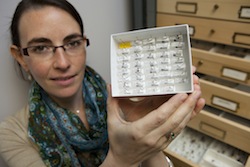 The nationwide School of Ants has found a home at the University of Florida. The school is an example of citizen science, a project where anybody can collect and submit data for experts to review and compile.
The nationwide School of Ants has found a home at the University of Florida. The school is an example of citizen science, a project where anybody can collect and submit data for experts to review and compile.
Ants are collected from personal yards and neighborhoods and then entomologists identify each species and plot its location. These digital maps provide a snapshot of any distribution around the county.
“Knowledge of the presence of a species of ant might help for things like quarantine and control, if the species is a problem,” said founder Andrea Lucky, and assistant scientist with UF’s Institute of Food and Agricultural Sciences. “If we find a rare ant, or an ant that’s way outside its known range, we many want to keep an eye on it purely for academic purposes.”
The program originated at North Carolina State University in 2011, between Andrea and Rob Dunn, a biology assistant professor. The expansion and movement of the headquarters to Florida has the team excited due to it having more ants than any other state.
“We want to really focus on Florida,” Lucky said. “The ant populations are so diverse, and we’re eager to get a handle on what’s here.”
Identifying that the invasive Asian needle ant had spread beyond its original home has been one of the school’s biggest accomplishments. The pest kills native ant populations in hardwood forests and carries a painful stinger.
If you are interested collecting ant specimens and mailing them in, be sure and record the location and time the ants were collected. Volunteers can register at the school’s website.
You can also keep up with the program by following them on Facebook and Twitter.
